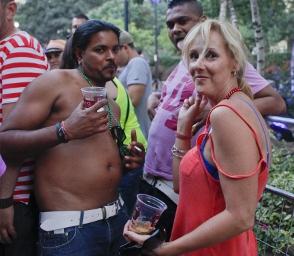People drinking at Pride say they found police to be more relaxed this year about public drinking. Police say that’s because of an improved relationship between them and the gay community.
Brandon Mincoff is a photographer who last attended Pride in 2009. Mincoff says he saw at least four people on Church St walking with open liquor, so he spoke with police officers for clarification. He says he proceeded to open a beer in front of the police officer and the officer did not ask him to stop.
“Nobody really knows about it, but you can have open alcohol,” he alleges.
Brad Resvick, 31, and Sarah O’Leary, 21, also say that they found police to be laid-back this year in response to public alcohol use. Resvick says that when he attended Pride last year, the police he encountered were less accommodating.
“They were a lot more stringent than this year,” he says.
But Constable Wendy Drummond, media relations officer for the Toronto police, says that police directives did not change between this year and last. Rather, she says, police take the size and festivity of Pride into account and choose not to enforce drinking laws as heavily.
“It’s similar to the marijuana march . . . where we’re not arresting and seizing drugs which are openly being smoked in front of us,” Drummond says. “Our officers felt that if public safety was not being jeopardized, then they would allow the festivities to continue.”
Inspector Gary Meissner, second-in-command for Division 51, was policing the parade. He says he lets his officers decide whether a situation calls for enforcing the rule against public drinking.
“When you’ve got a large group like this, the reality is that we need to use our discretion when we’re acting,” Meissner says. “So long as they’re not posing a danger to themselves or to others, then I leave it to my officers’ discretion.”
Meissner, who donned a rainbow-coloured Hawaiian lei for the parade, then adds, “The reality is we’re here to manage a world-class event. We’re here to see that diversity is respected; we’re here to have a good time.”
A new series of liquor laws was passed in Ontario in 2011. The legislation allows festival organizers to tear down beer tent boundaries, fence off entire festivals and make whole spaces alcohol-friendly, if organizers choose to do so.
Pride Toronto chose not to, however. Kevin Beaulieu, Pride Toronto’s executive director, says organizers decided to keep alcohol consumption enclosed in beer tents.
“The law is still relatively new and untested . . . and there are logistical issues,” Beaulieu says. “We need to provide a diversity of spaces that’s welcoming to everybody.”
In other words, the rules haven’t changed. So why has the vibe?
Constable Drummond thinks people are more comfortable around police, as a result of an improved relationship between police and the queer community.
“I think there’s been changes made by the Toronto police that have strengthened those relationships,” she says. “Toronto police have a number of different outreach programs that we’re involved with, and those ties . . . assist in opening up that dialogue.”


 Why you can trust Xtra
Why you can trust Xtra


